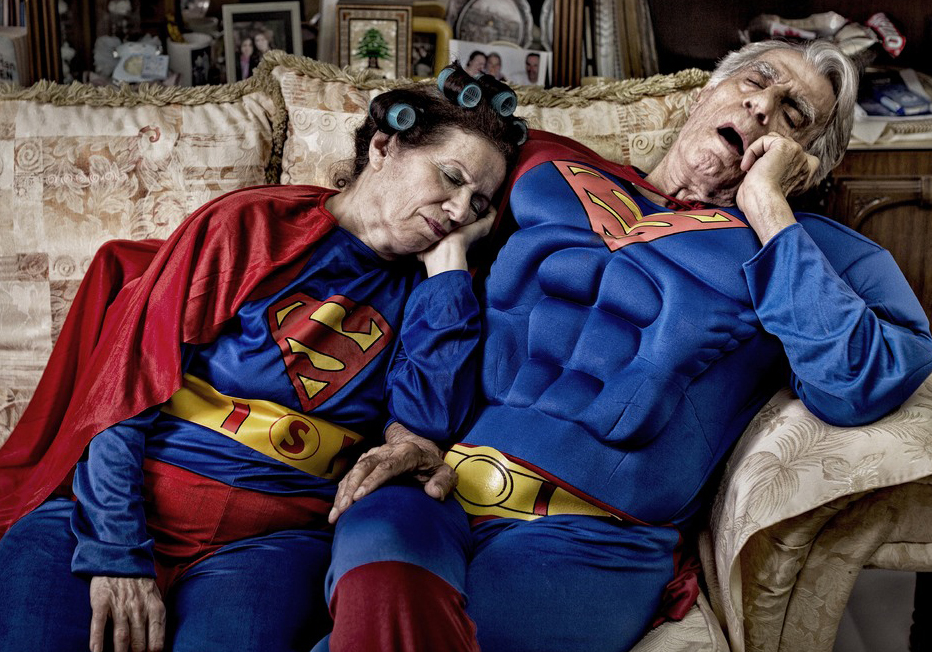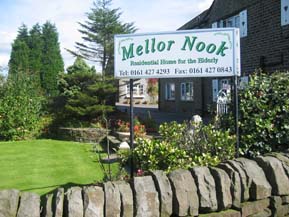Living Here
Putting principles into practice
The principles that govern life within Mellor Nook focus on the importance of promoting residents' independence through enabling them to make their own decisions, fostering their individuality, sustaining family and community contacts and ensuring that they are satisfied with the quality of life and care in the home.
Control and independence
Quality of life for individuals is enhanced because they are able to have control over what happens to them. We realise there is a danger that living in a group means people may lose control over their own lives.. It is obvious that in some cases the degree of dependency experienced by many of the residents will preclude any possibility of extensive independence. However, the spirit of the principles of control and independence govern the care provided to all residents.
Rules and routines
 So the imposition of rules and routines do not lead to an erosion of
residents' independence, we keep them to a minimum, and employed only
to promote rehabilitation (with the agreement of the resident). We fulfil
statutory requirements, prevent undue disturbance to other residents and
ensure acceptable standards of safety and hygiene.
So the imposition of rules and routines do not lead to an erosion of
residents' independence, we keep them to a minimum, and employed only
to promote rehabilitation (with the agreement of the resident). We fulfil
statutory requirements, prevent undue disturbance to other residents and
ensure acceptable standards of safety and hygiene.
Risk-taking
 At Mellor Nook responsible risk-taking is regarded as part of the normal
expression of people's independence. After appropriate assessment of risk,
residents are not discouraged or unduly restrained from undertaking certain
activities solely for fear of the consequences, for example that they
may hurt themselves. We feel excessive paternalism and concern for safety
may lead to infringement of personal rights. Those who are competent to
judge the risk themselves are free to make their own decisions so long
as they do not threaten the safety and lifestyle of others. The Management
and Senior Staff distinguishes between behaviour which endangers or seriously
inconveniences others and that which involves only the individual concerned.
The latter, such as going out unaccompanied, is restricted only if the
resident is not capable of making an informed decision for which he or
she can be responsible or if it runs counter to an existing agreed therapy
or treatment programme. The Management and Senior Staff recognises the
demands which is placed on junior staff and provides support and training
to assist them.
At Mellor Nook responsible risk-taking is regarded as part of the normal
expression of people's independence. After appropriate assessment of risk,
residents are not discouraged or unduly restrained from undertaking certain
activities solely for fear of the consequences, for example that they
may hurt themselves. We feel excessive paternalism and concern for safety
may lead to infringement of personal rights. Those who are competent to
judge the risk themselves are free to make their own decisions so long
as they do not threaten the safety and lifestyle of others. The Management
and Senior Staff distinguishes between behaviour which endangers or seriously
inconveniences others and that which involves only the individual concerned.
The latter, such as going out unaccompanied, is restricted only if the
resident is not capable of making an informed decision for which he or
she can be responsible or if it runs counter to an existing agreed therapy
or treatment programme. The Management and Senior Staff recognises the
demands which is placed on junior staff and provides support and training
to assist them.
Individuality
Mellor Nook's staff recognise the individuality of each of its residents this we feel goes to make a good home. From this recognition flows a style of management which enables our residents to make decisions for themselves, choose the way in which they spend their time, build friendships with whom they wish, and find satisfaction in living in the home environment.
Ways of maintaining individuality
We ensure that residents have their own private space, with plenty of reminders about their identity for them to maintain their individuality. Their rooms are places to withdraw to from busy, active communal areas, and choice over when they get up and go to bed all contribute to the process.
A resident's earlier life
We try at Mellor Nook not to underestimate or undervalue the qualities, experiences and talents of people in our care. Residents' willingness to share their past experiences, interests and life histories with their companions help create their individual identity for fellow residents and staff. To reinforce the esteem in which residents are held we encourage family and friends (with the residents' agreement) to be involved with the continued care of the resident.
Culture, background and ethnicity
Mellor Nook's principles and values determine that anyone, from any background, is treated as an individual. As people grow older, their earlier associations and allegiances remain important (and often become more so). Mellor Nook tries to reflect a residents particular ethnic, religious, educational, occupational and social background. Wherever possible, the staff complement reflects the cultural and ethnic mix of residents in the home.
Satisfaction with the quality of daily life
A key measure of the quality of life at Mellor Nook is the degree to
which residents are satisfied with their daily lives.This relates to:
· the activities of daily life;
· the quality of food and the way in which it is served;
· opportunities, for those who wish, to engage in social and leisure activities;
· quality of care;
· choice in daily routines;
· the skills and attitudes of staff, managers and volunteers.
Residents are able to look forward positively to the day, and days, ahead. The regular monitoring of residents' views about the quality of the service they receive is part of the management process. This is achieved by way of the residents Care Planning which includes a system to monitor and review residents activities and interests . Also every twelve months we carry out an extensive Quality Assurance programme, this is evaluated and acted upon. For people who may not communicate their feelings well this is done by using techniques such as 'care mapping' which involves careful observation of individuals over a specific period of time and assessment of their interaction and reactions, this is recorded in the care plan. Mellor Nook is receptive to any ideas and suggestions that residents, their family, friends and advocates might make to improve the general quality of life at Mellor Nook. It is recognised that relatives and friends are sometimes fearful of appearing critical . They are also often very grateful for the care given and feel guilty they can no longer provide this at home, so they do not want to criticise. Therefore Mellor Nook tries to generate a positive and easy welcome for ideas. Openness and receptivity is seen as a mark of good management and procedures are established for enabling this.
Daily life at Mellor Nook
Domestic routines are necessary for the smooth running the home and are part of the normal rhythm of most people's day. We take account of individual needs and preferences. As far as possible, routines are agreed with residents and carried out in a friendly and flexible way.
Examples of flexibility:
· changing the time of a regular events eg. baths, hairdresser etc. so that the care assistant can take the resident for a stroll or in to the summerhouse;
· a resident having a meal at a later time in the afternoon (instead of the meal at lunchtime) so that he or she can go out with family in the morning;
Getting up and going to bed
One example of the flexible approach to daily life is the extent to which residents are able to choose when they get up and when they go to bed. It is always their choice and never fixed to fit into a routine dictated by staff rotas. Some people can lose their sense of night and day. In these cases, assistance includes reviewing medication, the provision of highly visible clocks and orientation to daylight and darkness.
Mealtimes and food
Food and mealtimes are of great social importance in the lives of our residents. The degree to which residents are directly involved in choice, preparation and serving of meals and participating fully in mealtimes depends on their abilities but where possible the emphasis is on willing participatione
The following points observed:
· residents, according to their capacities, have the opportunity to be involved in menu planning, laying tables, clearing away and washing up. Staff make great efforts to find out individual preferences for types of food and style of preparation, particularly where residents are less able to do things for themselves;
· residents have regular opportunities to talk to the cook(s) about the sort of food they like and to comment on the meals they are given;
· assistance with eating food is given individually and discreetly and with care and sensitivity. Staff sit with the person they are assisting. Residents always have a choice of food so that they can avoid the type of food which they find difficult to handle (for example, peas). If people wish to eat in private in their own rooms they are able to do so. Care is taken by staff to enable residents to make their views known if another resident's messy eating habits cause distress to others;
· food preferences based on ethnic, religious and ethical observances are respected. Storage and preparation facilities are provided, and staff are trained in how to prepare different sorts of food and to find out what residents want.
· food is nutritious, well-balanced and appealing. Great efforts are made to ensure that food is offered which residents take pleasure in eating;
· the serving of food is seen as part of the social life of Mellor Nook. Quality matching crockery and tableware is very important to us. Care is taken to ensure that food offered to an individual resident is attractive even though it has to be appropriately prepared to meet the physical capacity of the individual. Food is only liquidised if absolutely necessary and care is taken to present it attractively (for example, by keeping different types and colours of food separate);
· Mellor Nook's dining room does not have the appearance of an institutional canteen. Furniture and furnishings are domestic in style and match the cottage atmosphere. Chairs are of a comfortable height with cushions (which can be pulled right up to the table) to assist those who have difficulty in getting up from sitting. Residents are able to choose how mealtimes are organised and how dining tables are arranged. Some residents enjoy setting the tables.
· Mellor Nook's dining room is non-smoking in line with the home's overall smoking policy;
· expert advice from dieticians is sought and followed with regard to nutritional requirements. Special diets specified on medical grounds are adhered to;
· the handling, storage, preparation and serving of food complies H.A.C.C.P, and all official requirements
· Mellor Nook achieves the Heart Beat award most consecutive years.
Activities
The therapeutic benefits derived from being physically and mentally active are well known and Mellor Nook provides stimulation of this sort for our residents. The range of opportunities available in the home for people to pursue leisure and intellectual activities reflect the diversity of the residents and their social and cultural interests and intellectual and physical capacities. Mellor Nook staff remember that just because people have become infirm and just because they have reached old age, it does not mean that they all have the same likes and dislikes. Not everyone wants to sit and watch television (or the same programme on television); not everyone likes playing bingo or having singsongs. Scope for choice and variety is made available. Residents confined to bed are as far as possible also have the opportunity for social interaction and intellectual stimulation.
· The involvement with the local community provides welcome social activity for residents. Children from schools sometimes visit and in some cases entertain residents. Carol singing at Christmas is a good example although this is not restricted to festival times. Local voluntary organisations have established a continuing relationship with the home which residents welcome. Residents are always consulted before any arrangements with outside organisations are established;
· Some residents maintain their religious links coming into Mellor Nook. We positively foster such links with religious and spiritual bodies of all faiths and denominations as appropriate. These are sometimes a source of comfort and reassurance to residents. The wishes of individual residents, not to have links of any sort with religious bodies is also respected. Religious belief are not be assumed;
· staff are sensitive to the changing needs of residents. Over time, some people may wish to withdraw from activities that previously they were closely involved in. These changing attitudes are picked up and acted upon via care plan reviews.
General examples of daily activities:
· gatherings in the home, coffee and tea groups;
· exercise classes, movement to music, dancing;
· books, newspapers (including large-print and audiotape);
· indoor and outdoor gardening (with modifications for disabled people);
· craft activities;
· intellectual activity education classes, quizzes, life history and reminiscence work;
· walking
· active games (carpet bowls);
· religious worship;
· shopping trips, outings;
· social events, local community activities.
· Trips out with relatives and friends.
For some residents, the ability to participate is limited by restricted movement, deafness, visual impairment or memory loss. When individual residents have a clear wish to participate in certain activities, every effort is made to help them overcome or compensate for these restrictions by providing personal assistance or aids and adaptations.
In everyday life, many families and friends enjoy doing things together and additional pleasure can be generated for residents and their visitors to socialise in the summerhouse. Visiting often increases when people feel that they are coming in to join in an activity or to assist residents.
Special occasions
Special occasions are important for both the communal life of Mellor Nook and for the individual. Residents' birthdays are celebrated; the opportunity to have a party is given to every resident
Clothes
 A person's sense of identity is partly linked to his or her appearance.
Clothes are an important part of this. All residents are encouraged to
wear their own identifiable clothes and the staff take great care to ensure
that clothes do not go astray or get damaged by careless handling. Residents
(and family and friends) are advised about the suitability of fabrics
for laundering when planning to purchase new clothes. Staff are ready
to assist in making arrangements to purchase new clothes. The following
points are to be observed:
A person's sense of identity is partly linked to his or her appearance.
Clothes are an important part of this. All residents are encouraged to
wear their own identifiable clothes and the staff take great care to ensure
that clothes do not go astray or get damaged by careless handling. Residents
(and family and friends) are advised about the suitability of fabrics
for laundering when planning to purchase new clothes. Staff are ready
to assist in making arrangements to purchase new clothes. The following
points are to be observed:
· all personal belongings of residents are treated with care;
· clothes are labelled discreetly with name tags to ensure they do not get lost during laundering. Families are asked to leave any cloths they bring in at the office so they can be named and recorded.
· opportunities for hand-washing and ironing are available and staff check regularly whether clothes need mending. Clothes may be taken for dry-cleaning if necessary. However residents and families must realise we have no professional expertise in specialised laundry.
· where residents have difficulty in dressing, for example because of arthritis or rheumatism, clothes are chosen which are easy to put on or have simple fastenings. Clothes which are easy to remove sometimes help people who suffer from incontinence. Occupational therapists offer us advice on this.
Personal care
It may be that some residents at Mellor Nook need assistance with personal care washing, dressing, eating, going to the toilet and getting about (either walking or in a wheelchair) in order to be able to participate in the social life of the home. Any tasks associated with providing care of this sort is undertaken with due regard to the privacy and dignity of the individual.
In particular:
· attention is paid to ensuring such things like catheters and colostomy bags are not exposed;
· special care is taken of dentures, spectacles and hearing aids;
· residents choose when they are washed or bathed and they are assisted in doing as much for themselves as they wish. While encouragement to bath regularly is given, rigid bath routines are avoided.
Terms of address
At Mellor Nook we take account of individual preferences in the way in which people are addressed. A person is entitled to be called whatever he or she wishes whether it be, for example, Mrs Smith, May Smith or May. Names and special names are not only labels of identity, they are personal possessions and are handled in the manner their owners choose. It is reasonable to wish to be addressed in different ways by different people. Even when people invite fellow residents to use their first or special names, they may still prefer strangers or members of staff to use a more formal mode of address. Staff never use terms of address which patronise residents or make them seem like children. They never discuss residents' personal matters in the hearing of other residents. They also never talk to each other over the head of a resident as if he or she were an inanimate object.
Personal relationships
Residents have opportunities for emotional, physical and sexual expression and for intimate and personal relationships within and outside Mellor Nook as they wish. Sensitivity is always shown to prevent possible exploitation of vulnerable individuals. The ability to manage relationships and to assume personal responsibility may fluctuate over time. Nevertheless residents continue to have the same needs as other people for expressive behaviour and physical human contact and these needs are respected.
Pets
Many older people value contact with pets and have had pets living with them until the time of moving into the home. The following points are taken into account:
Mellor Nook can in certain circumstances allow residents to bring their pets to live here with them
· We take into account the therapeutic benefit of pets (for some people) in deciding that it is quite acceptable for friends and relatives to bring pets to visit. As long as this is agreeable to residents who live here with their own pets.
· Mellor Nook have our own pets which belong to the home as a whole
Transport
Having access to transport improves the quality of many residents' lives. Mellor Nook has run our own minibus for the past twenty two years.
· rides in the local countryside;
· trips to a show;
· visiting friends;
· local events (church fate coffee mornings etc);
· hospital or the doctors;
John and Jim who drive the bus and cars, have the necessary qualifications and all formal requirements have been met (insurance, minibus regulations, driver training and certification, seatbelts, wheelchair clamps).
The role of staff, relatives, friends and visitors
The way in which staff, relatives and friends are involved with residents on a day-to-day basis affects residents' well-being and sense of satisfaction.
Staff
Mellor Nook staff have a responsibility to be alert to the needs of residents. They are ready to talk and listen to them during the course of the day and especially at night. Some residents may find it hard to express their true feelings about how they are and what they want to do. Care assistants are the best placed to discover some of these things while going about their general duties. They are also sympathetic and sensitive to the residents enabling them to express their feelings.
A normal and natural part of daily conversation for staff is to talk about what residents would like to do or have, about ideas for doing different things, or changes they would like made.
The Deputies ensures that opportunities are built into the staff routine so that time can be devoted to doing things with individual residents or to talking to them (especially about things which might be worrying them). The trust and friendship staff members is particularly important. The residents care plan is very important it notes that each resident has been spoken to each day. This record gives the opportunity for residents to talk about anything they wish.
Relatives and friends
Relatives and friends have an important role to play at Mellor Nook. They are encouraged to participate in the daily life of the home as long as the resident wants them to. This might involve doing shopping, reading and other social activities. While the benefits of involving relatives and friends are usually clear, we recognised that relationships between them and the resident may not always be harmonious. Staff are careful not to make unwarranted value judgements but are always ready to support the resident in whatever way is appropriate should the resident so wish.
The role of visitors
It may be that some people living at Mellor Nook have no relatives or friends to take an interest in them or provide advice and support in matters affecting their daily lives. Visitors that have been coming to Mellor Nook to see a relative or friend who has subsequently died often continue to visit. This is encouraged both by staff and residents.
Communication at Mellor Nook
Residents are kept informed about what is happening in the home so they are to be able to participate fully. Staff ensure that they keep residents informed directly. Reliance on non-personal means of communication (notice boards, residents meetings & Newsletters) is not substituted for direct communication between staff and residents as part of a normal social interaction.
Residents Input
Our residents have an opportunity to have a say in how the home is organised and run. Informal, natural, day-to-day conversations, for example over meals, at coffee time or on social occasions, are very productive. A more formal communication is available through the regular Quality Assurance programme.



